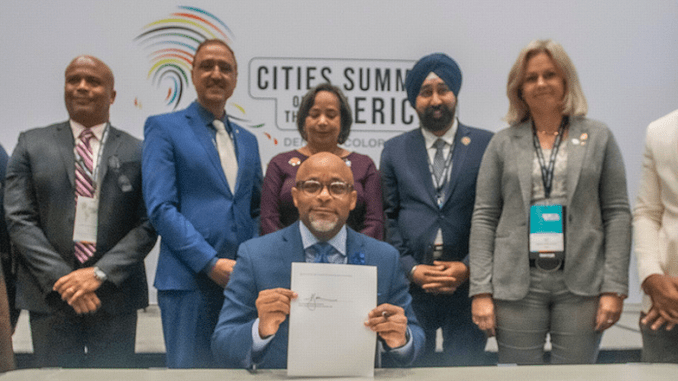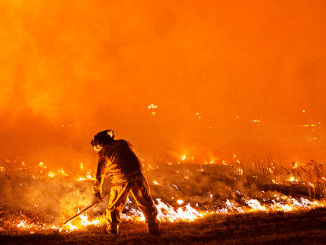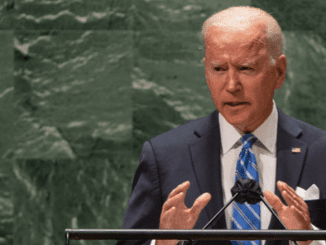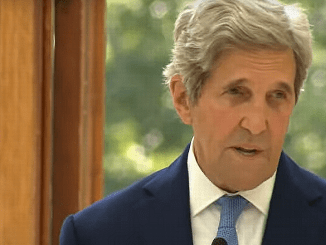
DENVER, Colorado, May 7, 2023 (ENS) – Michael B. Hancock, third-term mayor of Denver, the Mile High City in the Rocky Mountains, has worked his way up. He knows from experience how essential the role of local governments is in limiting climate change, integrating climate migrants, and building sustainable cities.
Mayor Hancock, a Democrat, joined with U.S. Secretary of State Antony Blinken and leaders from cities and communities across the Americas to sign the Denver Declaration at the inaugural Cities Summit of the Americas on April 28.
Rising through the University of Colorado, through local groups, to the Denver City Council, to the mayor’s seat, Hancock now chairs the Communications and Transportation committee of the U.S. Conference of Mayors. But Hancock is leaving the mayor’s post in July at the end of his third term; he views the Cities Summit as a highlight of his career.
“It has been an honor to host this inaugural gathering and welcome delegates from across the Americas to the Mile High City for these critical conversations,” Hancock said. “The Denver Declaration is the perfect way to cap a week of dialogue and new partnerships. It highlights the transformational work that began this week and will continue to benefit local communities throughout the hemisphere.”
Nearly 4,000 people attended the Cities Summit in downtown Denver, including 250 mayors representing 35 countries, to foster collaboration and inspire an ecosystem of ideas to address the most pressing issues facing cities, communities and urban areas.
Mayors from across the western hemisphere met with international organisations and senior U.S. government officials to discuss the impact of the climate crisis on urban migration and the need for more investment in city-led solutions.
During the three-day summit, leaders and representatives from across the Americas participated in plenary sessions, roundtables, panels and networking sessions focused on the intersection of global issues and the role cities play in the development of multinational policies and commitments.
Partnerships and relationships built this week resulted in the Denver Declaration on City Priorities for Regional Cooperation, a call to national governments, regional and international organizations, and the private sector to join with participating cities to act on housing and sustainable development, migration, climate change, and digital transformation.
The document reinforces the mission of the Cities Summit to expand international engagement and cooperation among one another and with national governments and international organizations. Ultimately, events like these strengthen collaboration, connections, and shared ambition toward a more sustainable, resilient, and equitable future.
The Denver Declaration has been signed by Mayor Hancock and over 50 other mayors. The full declaration along with a full list of signatories is attached.
Signatories of the Denver Declaration are encouraging a Second Cities Summit of the Americas, to be held in conjunction with the Tenth Summit of the Americas in 2025.
Bridging the Local-National-International Climate Migration Gap
This inaugural summit was the scene of the first-ever climate migration conversation between the U.S. government and international mayors from across the Americas.
As they addressed ways to unlock funding for city-led inclusive climate action, the U.S. Agency for International Development, USAID, announced the launch of an initiative to develop city-specific roadmaps to support urban adaptation and unlock more financing for city action on climate migration.
USAID Deputy Assistant Administrator for Latin America and the Caribbean Mileydi Guilarte announced a new $1 million investment across Latin America and Caribbean to help build cities’ resilience to the impacts of climate change, with a focus on addressing the unique needs of migrant communities.
Guilarte recognized, “Climate change is one of any number of stressors that has altered everyday life for families throughout Latin America and the Caribbean. As the effects of climate change intensify, livelihoods are being negatively impacted, causing some to uproot and seek a better life in another community, city or even country.”
“USAID is working throughout Latin America and the Caribbean to address the economic effects of climate change and how it contributes to migration. We are committed to working with cities throughout the region to provide support as they welcome migrants and create programs to help them become an integral part of their new communities,” Guilarte said.
Guilarte made the announcement at a closed-door roundtable convened by USAID, the U.S. State Dept. Bureau of Population, Refugees and Migration, together with the Mayors Migration Council, MMC, the Climate Migration Council, and C40 Cities, a global network of mayors united in action on the climate crisis.
Representatives from the UN Migration Agency, IOM, the UN Refugee Agency, UNHCR, and senior representatives from the CAF-Development Bank of Latin America also attended with mayors and county officials.
They focused on city-led solutions to climate migration, such as: investments to better adapt in place and reduce displacement, approaches to facilitate the dignified movement of those who live in risk-prone areas, and solutions to foster the social and economic inclusion of newcomers, including through the creation of good, green jobs.
They explored ways to strengthen city-national diplomacy ties and collaboration among the C40-MMC Global Mayors Action Agenda on Climate and Migration, the Climate Migration Council’s Declaration, and the Biden Administration’s policies, including the President’s Emergency Plan for Adaptation and Resilience, PREPARE, and USAID’s Climate Strategy.
Intended to support vulnerable migrants through the development of city-level plans that foster local integration, reduce disaster risk and strengthen climate resilience in cities, the $1 miillion investment is a step toward fulfilling the recommendations in President Joe Biden’s Report on the Impact of Climate Change on Migration two years ago.
Responding to a call from C40-MMC mayors from across the United States, the report marked the first time the U.S. government officially recognised the impact of climate breakdown on migration and committed to “scaling up support to urban areas to help localities plan for, accommodate, and integrate migrants and those displaced” and “build resilient urban systems.”
Mark Watts, executive director of C40 Cities, said, “C40 mayors are working to deliver 50 million good, green jobs by 2030 in their cities. As the majority of migrants live in urban areas, investment in green job creation represents an opportunity to support migrants, boost the economy and shift towards a greener future. Good, green jobs provide people with an alternative to forced migration, create livelihoods for people on the move, and foster the economic inclusion of newcomers to destination cities. It’s a win for people and the planet.”
C40, the Mayors Migration Council and the Climate Migration Council welcomed the Biden Administration’s efforts to deliver against these climate migration commitments in the United States and abroad.
Vittoria Zanuso, executive director of the Mayors Migration Council, said, “While climate change is a crisis, the human mobility it creates doesn’t need to be. Global mayors are stepping up as problem solvers, but they need better national policies and direct access to funding to deliver at scale.”
“USAID’s investment in Latin American cities is a great step in this direction,” Zanuso said. “The Mayors Migration Council is ready to partner with USAID to make this project a success so we can support more cities in other parts of the world and make this new model business-as-usual.”
The Mayors Migration Council is providing direct cash assistance to cities, not only for emergency shelter but for permanent homes, job training and other services that will welcome families to their new homes.

Cities such as Barranquilla, Colombia are using funding from the Mayors Migration Council to connect newcomers to jobs.
In Denver, Mayor of Barranquilla Jaime Pumarejo told the roundtable, “The city of Barranquilla is working to meet this need: welcoming those displaced by climate, improving resilience to urban climate risks, and fostering newcomers’ inclusion in our social and economic fabric. We are willing to work with local, national and international actors to bring these experiences to scale and enhance their replication in other cities, in Colombia and across the Americas.”
Shana Tabak is a human rights lawyer and scholar with expertise in global migration and refugee law, human rights, climate, and gender justice. An adjunct professor of human rights at Georgetown Law and an affiliated scholar with the Institute for the Study of International Migration, Tabak also serves as advisor to the Climate Migration Council and director of Immigration Strategy at the Emerson Collective, a California corporation using philanthropy, impact investing, advocacy, and community engagement for immigration reform, among other causes.
Advocating an international move from commitment to action, Tabak said, “At today’s roundtable, leaders from rapidly urbanizing Latin American cities described innovative strategies – and the financial support they require – if they are to successfully adapt as our changing climate pushes more and more people to migrate within and across borders.”
“The Climate Migration Council is committed to generating action that will build resilience in communities of individuals most impacted by climate change, and to mobilizing the global community to ensure that individuals uprooted from their homes have the support they need as they seek safety,” she said.
“We hope that the conversation today inspires more subnational leaders to join the Council and champion its cause,” Tabak said.
Cities Forward
To further the objectives of the Cities Summit, in June 2022 Secretary of State Blinken announced the launch of the administration’s Cities Forward initiative, a peer-to-peer knowledge sharing, capacity building, and diplomatic engagement program focused on solving urban issues ranging from sustainability to inclusion to climate resiliency.
Contributing U.S. agencies will equip local leaders throughout the region with new tools and new partnerships with U.S. city and private sector partners to address shared challenges.
The Cities Forward initiative will have three interconnected components that will be rolled out in phases.
The first phase will match large, medium and small cities in the United States with counterparts in Latin America and the Caribbean for peer-to-peer learning and connection.
The second phase will consist of a series of multi-stakeholder charrettes held in participating cities to help them develop their own sustainability action plans.
In the third phase, Cities Forward will help cities achieve the goals they have set for themselves through partnerships with the private sector, the research and academic community, philanthropies, NGOs, development finance entities, multilateral organizations, and U.S. government agencies.
Cities Forward will be guided by three key principles: 1) It will be city-led: local stakeholders will lead action plan design and local project implementation; 2) The least are first: actions taken must benefit the cities’ poorest, most vulnerable citizens; and 3) Sustainability: solutions must be environmentally, economically and socially sustainable.
Buildings Hold a Big Key to Climate Stability
Building emissions account for almost 40 percent of U.S. greenhouse gas emissions. President Biden has set a target to reduce overall U.S. emissions 50-52 percent below 2005 levels by 2030 and achieve net-zero emissions economy wide no later than 2050.
Pointing out that two-thirds of low-income U.S. households have high energy burdens, the Biden Administration is also focused on lowering energy costs for Americans.
On May 4, the White House convened 24 governors’ offices to discuss how the administration can amplify states’ efforts on commercial and residential building decarbonization policies that lower utility bills, improve climate resilience, and reduce emissions.
In attendance were Ali Zaidi, the National Climate Advisor, Brenda Mallory, Chair of the Council on Environmental Quality, CEQ, and senior officials from the U.S. Department of Energy, U.S. Department of Housing and Urban Development, HUD, and the Environmental Protection Agency.
They discussed pathways to accelerate progress through federal-state partnership, the Inflation Reduction Act, the Bipartisan Infrastructure Law, and technical support from the Energy Department and the EPA.
Administration officials highlighted how states are uniquely positioned to cut building related emissions using financial tools available to them as part of the Bipartisan Infrastructure Law and Inflation Reduction Act and are setting the pace for progress by advancing creative policy pathways and innovative programs.
The State of Maine highlighted how it is bringing heat pumps to rural underserved communities, which has resulted in lower energy bills for Maine families and cleaner air. They also shared that starting in 2024, Maine Housing will be financing Passive House Certified affordable housing, which uses upwards of 40-60 percent less energy than code-built buildings, at minimal additional cost.
The group discussed how Louisiana is investing in energy and building codes to increase climate resiliency in the face of catastrophic hurricanes and flooding, while reducing emissions and cutting utility costs for households.
The White House officials, and those from DOE, EPA, and HUD shared technical resources that will be available to states and communities to support their efforts to reduce energy waste in the building sector and create jobs.
G7 to Work With Local Governments
On April 15-16, the G7 Ministers’ Meeting on Climate, Energy and Environment in Sapporo, Japan took an historic step in advancing multilevel governance for climate, energy and environmental action.
The G7 ministers announced the first-ever G7 Roundtable on Subnational Climate Actions in collaboration with Urban7, or U7, the voice of local governments in the G7 process.
In their final Communiqué, the G7 Ministers recognized, “the vital role of subnational actors in realizing the transformation toward net-zero, climate-resilient, circular, and nature positive economies, furthering socioeconomic opportunities based on local capacity, needs and individual environmental conditions.”
The Ministers committed to, “catalyze support for actions by subnational actors, encourage sharing best practices and promote city-to-city cooperation.”
The Ministers established the G7 Roundtable on Subnational Climate Actions, as a forum “for G7 members to share national policies and programs promoting subnational climate actions both domestic and across borders.”
Mayor Kizo Hisamoto or Kobe, Japan serves as the 2023 U7 Group Chair and the Japan Designated City Mayors’ Association President. “We believe that such an open dialogue and partnership will contribute to furthering the fight against climate change, which is a key global challenge,” he said. “The U7 will continue to make further contributions to solving the global challenges confronting the G7 countries.”
Mayor Peter Kurz of ICLEI Member City Mannheim, Germany, who is also the Chair of the Global Parliament of Mayors, said, “We applaud the G7 Ministers for Climate, Energy and Environment’s recognition of the value of multi-level governance, and welcome their invitation for the U7 to join the G7 Roundtable on Subnational Climate Actions. Only through open dialogue and decisive partnership like this can we jointly develop the regulatory and financial framework conditions needed to accelerate decarbonisation and reach our shared climate goals.”
The outcomes of the Roundtable will be presented to the G20 and at COP28 in Dubai later this year. The G7 Ministers of Climate, Energy and Environment also committed to continuing to work with the G7 Ministers responsible for urban development on net-zero and resilience agendas.
Local Governments Recognized in UN Climate Process
Recent advances for local governments include the recognition of all levels of government in the 2015 Paris Agreement; the underlined need for multilevel action in the 2021 Glasgow Climate Pact; as well as the convening of the first-ever Ministerial Meeting on Urbanization and Climate Change at COP27 in Sharm El Sheikh in November 2022.
Since its inception in 2021, the U7 has become an important player in the G7 process, especially with its unprecedented recognition in the final communiqués of several ministers’ meetings, and by the G7 Heads of State in 2022.
Cities also generate the majority of carbon emissions, but, because of their scale and levels of innovation, hold the key to achieving net zero.
Core Cities UK, an alliance of cities, convened the first G7 U7 urban summit with city leaders from Canada, France, Germany, Italy, Japan, the United Kingdom and the United States.
Councillor Nick Forbes, leader of Newcastle City Council and chair of the alliance Core Cities UK, said, “We used to be the villains of the climate change debate, but we are now recognized as the heroes. For example, my own city of Newcastle is one of only four places to be rated A by the Carbon Disclosure Project.”
Throughout 2023, the U7 has been working closely with the Japanese Ministry of the Environment to ensure that the voices of cities are included in G7 debates.
The U7 advocates for a continuous dialogue between G7 nations and municipal actors, represented by national associations and supported by international city networks. The U7 Secretariat is composed of the Global Parliament of Mayors and ICLEI-Local Governments for Sustainability, an international non-governmental organization based in Bonn, Germany.
U7’s long-term goal is to be recognized as an official G7 Engagement Group.
Reflecting on the April G7 event, ICLEI President Mayor Frank Cownie of Des Moines, Iowa said, “The leadership shown by the G7 Ministers for Climate, Energy and Environment amplifies a fact well understood by those who take climate change seriously: a resilient, net-zero future will be achieved when cities, regions and nations work in full cooperation to address the climate emergency.”
Green Building Council Decarbonizing Cities
The U.S. Green Building Council, USGBC, developers of the LEED green building rating system, has announced the 2023 cohort of 13 cities selected to participate in its LEED for Cities Local Government Leadership Program. The program aims to help local governments set goals, collect data, and validate performance through LEED for Cities certification.
“The 13 cities selected for this year’s LEED for Cities cohort are joining dozens of other communities across the U.S. that are setting and tracking goals towards better sustainability, resilience, and quality of life,” Peter Templeton, USGBC president and CEO, said on April 13. “City and county governments understand the climate challenges their communities face and are using the LEED for Cities framework to ensure measurable progress is made in addressing them.”
As of today, more than 125 local governments have achieved LEED for Cities certification and nearly 200 are in the LEED process. The LEED for Cities system provides a roadmap to help jurisdictions evaluate and track progress on economic, environmental and social conditions.
Certification helps local governments achieve meaningful results such as attracting new economic activity, reaching global climate goals, improving air and water quality, and enhancing quality of life for all.
Bank of America has been a USGBC partner and member since 1997. Since 2011, it has provided over $4.1 million in total grant funding to the nonprofit. It also has integrated sustainability into its building design standards since 2005 and used those standards to deliver workspaces that are LEED certified across its global footprint.
“Buildings and communities have the ability to regenerate and sustain the health and vitality of those who inhabit them,” said Alex Liftman, global environmental executive at Bank of America. “USGBC is at the forefront of driving the development of green buildings and spaces, and through our long-standing partnership we have seen the creation of more prosperous, resilient, and equitable communities. We are looking forward to seeing these 13 cities’ hard work and action result in LEED for Cities certification.”
The 2023 cohort of 13 cities joins 77 local governments that have participated in the program for a total of 90 cities.
Cities participating in this round have expressed their intent to use LEED for Cities certification results to attract federal grant dollars for initiatives supporting community resilience and advancing social equity in line with the White House Justice40 initiative, signed in the first weeks of the Biden Administration
Justice40 makes it a goal that 40 percent of the overall benefits of certain federal investments flow to disadvantaged communities that are marginalized, underserved, and overburdened by pollution.
The categories of investment in Justice40 covered programs are: climate change, clean energy and energy efficiency, clean transit, affordable and sustainable housing, training and workforce development, remediation and reduction of legacy pollution, and the development of critical clean water and wastewater infrastructure.
This leadership cohort brings together diverse local governments from around the U.S. to pursue LEED for Cities certification.
The 2023 cohort of cities represents a population of nearly 3.5 million Americans. The cities are: Colorado Springs, Colorado; Des Moines, Iowa; Grand Junction, Colorado; Lantana, Largo, North Miami,and Palm Coast, Florida; Lawrence, Kansas; Lexington, Kentucky; Plano, Texas; San Diego, California; Scottsdale, Arizona; and South Bend, Indiana.
The program provides peer-to-peer networking opportunities, technical assistance and access to educational resources, and covers fees for USGBC membership, registration and certification reviews for participating governments.
As of today, more than 125 local governments have achieved LEED for Cities certification and nearly 200 are in the LEED process. The LEED for Cities system provides a road map to help jurisdictions evaluate and track progress on economic, environmental and social conditions. Certification helps local governments achieve meaningful results such as attracting new economic activity, reaching global climate goals, improving air and water quality, and enhancing quality of life for all.
Featured image: Denver Mayor Michael Hancock displays the signed Denver Declaration backed by mayors who signed the document from across the Americas. April 28, 2023 (Photo courtesy Mayor Michael Hancock via Facebook)
© 2023, Environment News Service. All rights reserved. Content may be quoted only with proper attribution and a direct link to the original article. Full reproduction is prohibited.



